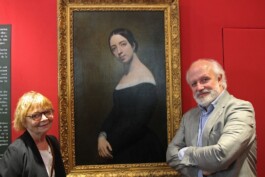


July 17th 2021
"I then realised how much this great lady had been forgotten. I gathered all my energies so that this place of memory would be restored and that more and more of my contemporaries would become aware of the immense example of Pauline, the polymath, the European. On 15 July 2021, on the occasion of the inauguration of the Pauline García Viardot Garden in the 9th arrondissement of Paris, the founding chairman of the Centre Européen de Musique pronounced these words, dedicated to the immense opera singer:
"Whoever feels a true love for his art can fear nothing. These are the words of George Sand, in her novel Consuelo, inspired by and dedicated to Pauline. They reflect the life of one of the greatest musicians of all time: pianist, singer, composer, who often said that music was the primary language of her life, so that she does not remember not having known it.
200 years after her birth, almost to the day, we are here together, thanks to the City of Paris, the City Hall of the 9th arrondissement, to pay tribute, somewhat belatedly, to one who remains an example for the challenges that are still ours.
At a time when we are finally looking at the place of women in society, and we are considering a necessary rereading of the history of women in creation, she is here to tell us that she was and that she did it.
At a time when Europe is reflecting on its future and when we need to include culture as an essential foundation for the continuation of this beautiful history that is the European Union, she is here to tell us that this was her goal at a time when, in the 19th century, she brought together all the great minds of Europe, from the Urals to the Atlantic, from the Scandinavian countries to the Balkans, building a European cultural consciousness, the only bulwark according to them against nationalist and imperialist pressures. Once again she did so and she was this "Mother Europe" who calls us, in the face of the challenges we face, to return to the foundations of this European construction.
At a time when culture is going through many difficulties, Pauline, throughout her life as a musician, editor, teacher, mentor of young composers, designer, costume designer and letter writer, reminds us of the importance of culture, as Stefan Zweig said in 1932: "In the history of wars, peoples are only presented as enemies, but in the history of culture, they appear as brothers.
This Parisian woman, who was born on rue de Richelieu and died on boulevard de Saint Germain, having lived most of her life not far from here on rue de Douai, with strong Spanish roots, was to become one of the most cosmopolitan and essential women in European history. Thanks to her, a bridge was established between the West and Russia, and thanks to her, the continuity of a vocal genealogy, initiated by her father Manuel Garcia and continued by her brother Manuel, became synonymous with excellence to this day. An excellence that has irrigated the throats of European and American singers, and since then also of Asian singers. The Italian Bel Canto owes its letters of nobility to a Spanish family living in Paris: that is also Europe! Yes, because it is diversity and that is how it becomes universal. Pauline also assumes this diversity as a composer. She composed melodies in five different languages, even expanding into other languages such as Serbian or old Tuscan. At a time when ethnomusicology was not yet a real discipline, Pauline collected Berrichon songs during her walks with her friend George Sand in Nohant and harmonised them with traditional Spanish, Russian or Serbian songs.
By honouring Pauline Viardot, France and Europe are celebrating, hand in hand, one of the great figures of their millennial history. The European pantheon, the fruit of our common cultural heritage, opens its doors to an exceptional woman who has never ceased to transcend borders and to nourish the idea of a transnational and fraternal consciousness, with music as her identity and Europe as her horizon.
Today, the European Music Centre wants to perpetuate this example in Bougival. Where she lived from 1874 to 1883, where she also brought together all the great minds of Europe and beyond.
She has thus become the tutelary figure of our project. Today, the Villa Viardot, which was completely abandoned, has been restored. Unfortunately, because of the pandemic, it will not reopen on 18 July 2021. It will only be in the spring of 2022. Pauline's example will survive in this Centre européen de musique, an ecologically responsible cultural district. Today it tells a story of Europe and sets up an island of Europe within the Ile-de-France. The Centre Européen de Musique will perpetuate the holistic spirit of this extraordinary woman.
Jorge Chaminé, Chairman of the Centre européen de musique
Extract from the speech given on the occasion of the inauguration of the Pauline García Viardot Garden, on 15 July 2021, at 26 rue Chaptal, in the 9th arrondissement of Paris.

Sandra Mamboury, great-great granddaughter of Pauline Viardot, and Jorge Chaminé in front of the portrait of Pauline painted by Ary Scheffer, in the Musée de la Vie romantique (rue Chaptal in Paris).
Other posts on Pauline Viardot:
- "Le passé au présent, voyage au 21e siècle avec mon ancêtre Pauline Viardot". Interview with the author of the book: the novelist and journalist Sandra Mamboury.
- The replay in photos and videos of the major events commemorating Pauline Viardot.
July 17th 2021
"I then realised how much this great lady had been forgotten. I gathered all my energies so that this place of memory would be restored and that more and more of my contemporaries would become aware of the immense example of Pauline, the polymath, the European. On 15 July 2021, on the occasion of the inauguration of the Pauline García Viardot Garden in the 9th arrondissement of Paris, the founding chairman of the Centre Européen de Musique pronounced these words, dedicated to the immense opera singer:
"Whoever feels a true love for his art can fear nothing. These are the words of George Sand, in her novel Consuelo, inspired by and dedicated to Pauline. They reflect the life of one of the greatest musicians of all time: pianist, singer, composer, who often said that music was the primary language of her life, so that she does not remember not having known it.
200 years after her birth, almost to the day, we are here together, thanks to the City of Paris, the City Hall of the 9th arrondissement, to pay tribute, somewhat belatedly, to one who remains an example for the challenges that are still ours.
At a time when we are finally looking at the place of women in society, and we are considering a necessary rereading of the history of women in creation, she is here to tell us that she was and that she did it.
At a time when Europe is reflecting on its future and when we need to include culture as an essential foundation for the continuation of this beautiful history that is the European Union, she is here to tell us that this was her goal at a time when, in the 19th century, she brought together all the great minds of Europe, from the Urals to the Atlantic, from the Scandinavian countries to the Balkans, building a European cultural consciousness, the only bulwark according to them against nationalist and imperialist pressures. Once again she did so and she was this "Mother Europe" who calls us, in the face of the challenges we face, to return to the foundations of this European construction.
At a time when culture is going through many difficulties, Pauline, throughout her life as a musician, editor, teacher, mentor of young composers, designer, costume designer and letter writer, reminds us of the importance of culture, as Stefan Zweig said in 1932: "In the history of wars, peoples are only presented as enemies, but in the history of culture, they appear as brothers.
This Parisian woman, who was born on rue de Richelieu and died on boulevard de Saint Germain, having lived most of her life not far from here on rue de Douai, with strong Spanish roots, was to become one of the most cosmopolitan and essential women in European history. Thanks to her, a bridge was established between the West and Russia, and thanks to her, the continuity of a vocal genealogy, initiated by her father Manuel Garcia and continued by her brother Manuel, became synonymous with excellence to this day. An excellence that has irrigated the throats of European and American singers, and since then also of Asian singers. The Italian Bel Canto owes its letters of nobility to a Spanish family living in Paris: that is also Europe! Yes, because it is diversity and that is how it becomes universal. Pauline also assumes this diversity as a composer. She composed melodies in five different languages, even expanding into other languages such as Serbian or old Tuscan. At a time when ethnomusicology was not yet a real discipline, Pauline collected Berrichon songs during her walks with her friend George Sand in Nohant and harmonised them with traditional Spanish, Russian or Serbian songs.
By honouring Pauline Viardot, France and Europe are celebrating, hand in hand, one of the great figures of their millennial history. The European pantheon, the fruit of our common cultural heritage, opens its doors to an exceptional woman who has never ceased to transcend borders and to nourish the idea of a transnational and fraternal consciousness, with music as her identity and Europe as her horizon.
Today, the European Music Centre wants to perpetuate this example in Bougival. Where she lived from 1874 to 1883, where she also brought together all the great minds of Europe and beyond.
She has thus become the tutelary figure of our project. Today, the Villa Viardot, which was completely abandoned, has been restored. Unfortunately, because of the pandemic, it will not reopen on 18 July 2021. It will only be in the spring of 2022. Pauline's example will survive in this Centre européen de musique, an ecologically responsible cultural district. Today it tells a story of Europe and sets up an island of Europe within the Ile-de-France. The Centre Européen de Musique will perpetuate the holistic spirit of this extraordinary woman.
Jorge Chaminé, Chairman of the Centre européen de musique
Extract from the speech given on the occasion of the inauguration of the Pauline García Viardot Garden, on 15 July 2021, at 26 rue Chaptal, in the 9th arrondissement of Paris.

Sandra Mamboury, great-great granddaughter of Pauline Viardot, and Jorge Chaminé in front of the portrait of Pauline painted by Ary Scheffer, in the Musée de la Vie romantique (rue Chaptal in Paris).


Playlist